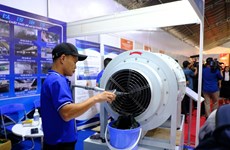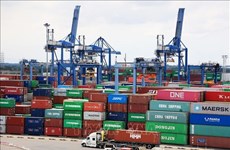Belgium daily: EU divided over tax decision against VN
The Council of European Union (CEU)’s decision on the extension of anti-dumping
duties on leather-capped shoes from Vietnam and China for 15 months has created
a division among EU members, reported a Belgium daily.
The Council of European Union (CEU)’s decision on the extension of anti-dumping
duties on leather-capped shoes from Vietnam and China for 15 months has created
a division among EU members, reported a Belgium daily.
The Evening (Le Soir) newspaper on Dec. 23 ran an article saying that European countries that still have a shoemaking industry such as Italy support the decision, which is in stark contrast to northern European countries that are in favour of free trade.
European well-known shoemakers that are producing a huge volume of footwear in Asia such as Adidas, Puma, Timberland and PME also decried the continued imposition of anti-dumping taxes.
“First, the financial crisis that has made our exports to plunge down by 16 percent in 2009. And now, the extension of anti-dumping measures against our leather shoes by the European Union, our biggest customer. This has caused severe impacts on our workers," Nguyen Thi Tong, Secretary General of the Leather and Footwear Association (LEFASO) of Vietnam was quoted as saying.
Meanwhile, Truong Quoc Can, an ActionAid’s representative in Hanoi , called it an “unfair and contradictory” decision.
“On the one hand, the EU spends a lot of money for programmes to reduce poverty in Vietnam and on the other hand, it imposes heavy taxes that directly affect the country’s most vulnerable workers,” Can was quoted as saying.
Simultaneously on Dec. 23, the Vietnamese government voices dissatisfaction with the anti-dumping tax decision.
“This is an unobjective and unfair decision and does not reflect the practical conditions of Vietnamese footwear production and business in the country. It goes counter to the trade liberalisation spirit launched and promoted by the European Union,” Vietnamese Foreign Ministry’s spokesperson Nguyen Phuong Nga said.
She went on to say that the decision has not only created negative impacts on workers in developing nations like Vietnam but EU importers, distributors, retailers and consumers as well./.
The Evening (Le Soir) newspaper on Dec. 23 ran an article saying that European countries that still have a shoemaking industry such as Italy support the decision, which is in stark contrast to northern European countries that are in favour of free trade.
European well-known shoemakers that are producing a huge volume of footwear in Asia such as Adidas, Puma, Timberland and PME also decried the continued imposition of anti-dumping taxes.
“First, the financial crisis that has made our exports to plunge down by 16 percent in 2009. And now, the extension of anti-dumping measures against our leather shoes by the European Union, our biggest customer. This has caused severe impacts on our workers," Nguyen Thi Tong, Secretary General of the Leather and Footwear Association (LEFASO) of Vietnam was quoted as saying.
Meanwhile, Truong Quoc Can, an ActionAid’s representative in Hanoi , called it an “unfair and contradictory” decision.
“On the one hand, the EU spends a lot of money for programmes to reduce poverty in Vietnam and on the other hand, it imposes heavy taxes that directly affect the country’s most vulnerable workers,” Can was quoted as saying.
Simultaneously on Dec. 23, the Vietnamese government voices dissatisfaction with the anti-dumping tax decision.
“This is an unobjective and unfair decision and does not reflect the practical conditions of Vietnamese footwear production and business in the country. It goes counter to the trade liberalisation spirit launched and promoted by the European Union,” Vietnamese Foreign Ministry’s spokesperson Nguyen Phuong Nga said.
She went on to say that the decision has not only created negative impacts on workers in developing nations like Vietnam but EU importers, distributors, retailers and consumers as well./.













